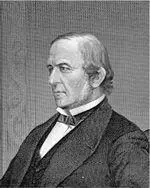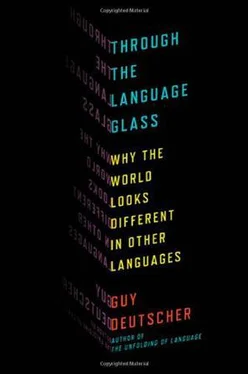But first-off to the fighting over the rainbow.
PART I: THE LANGUAGE MIRROR
1. Naming the Rainbow
London, 1858. On the first of July, the Linnean Society, in its magnificent new quarters at Burlington House in Piccadilly, will hear two papers by Charles Darwin and Alfred Russel Wallace announcing jointly a theory of evolution by natural selection. Before long, the flame will flare up and illuminate the intellectual firmament, leaving no corner of human reason untouched. But although the wildfire of Darwinism will catch up with us soon enough, we do not begin quite there. Our story starts a few months earlier and a few streets away, in Westminster, with a rather improbable hero. At forty-nine, he is already an eminent politician, member of Parliament for Oxford University, and ex-chancellor of the Exchequer. But he is still ten years away from becoming prime minister, and even further from being celebrated as one of Britain’s greatest statesmen. In fact, the Right Honorable William Ewart Gladstone has been languishing on the opposition benches for the last three years. But his time has not been idly spent.
While out of office, he has devoted his legendary energies to the realm of the mind, and in particular to his burning intellectual passion: that ancient bard who “founded for the race the sublime office of the poet, and who built upon his own foundations an edifice so lofty and so firm that it still towers unapproachably above the handiwork not only of common, but even of many uncommon men.” Homer’s epics are for Gladstone nothing less than “the most extraordinary phenomenon in the whole history of purely human culture.” The Iliad and the Odyssey have been his lifelong companions and his literary refuge ever since his Eton schooldays. But for Gladstone, a man of deep religious conviction, Homer’s poems are more than merely literature. They are his second Bible, a perfect compendium of human character and experience that displays human nature in the most admirable form it could assume without the aid of Christian revelation.
Gladstone’s monumental oeuvre, his Studies on Homer and the Homeric Age , has just been published this March. Its three stout, door-stopping tomes of well over seventeen hundred pages sweep across an encyclopedic range of topics, from the geography of the Odyssey to Homer’s sense of beauty, from the position of women in Homeric society to the moral character of Helen. One unassuming chapter, tucked away at the end of the last volume, is devoted to a curious and seemingly marginal theme, “Homer’s perception and use of color.” Gladstone’s scrutiny of the Iliad and the Odyssey revealed that there is something awry about Homer’s descriptions of color, and the conclusions Gladstone draws from his discovery are so radical and so bewildering that his contemporaries are entirely unable to digest them and largely dismiss them out of hand. But before long, Gladstone’s conundrum will launch a thousand ships of learning, have a profound effect on the development of at least three academic disciplines, and trigger a war over the control of language between nature and culture that after 150 years shows no sign of abating.
Even in a period far less unaccustomed than ours to the concurrence of political power and greatness of mind, Gladstone’s Homeric scholarship was viewed as something out of the ordinary. He was, after all, an active politician, and yet his three-volume opus would have been no mean achievement as the lifetime’s work of a dedicated don. To some, especially political colleagues, Gladstone’s devotion to the classics was the cause of resentment. “You are so absorbed in questions about Homer and Greek words,” a party friend complained, “that you are not reading newspapers or feeling the pulse of followers.” But for the general public, Gladstone’s virtuoso Homerology was a subject of fascination and admiration. The Times ran a review of Gladstone’s book that was so long it had to be printed in two installments and would amount to more than thirty pages in this book’s type. Nor did Gladstone’s erudition fail to impress in intellectual circles. “There are few public men in Europe,” was one professor’s verdict, “so pure-minded, so quick-sighted, and so highly cultivated as Mr. Gladstone.” In the following years, books by distinguished academics in Britain and even on the Continent were dedicated to Gladstone, “the statesman, orator, and scholar,” “the untiring promoter of Homeric Studies.”

William Ewart Gladstone, 1809-1898
Of course, there was a but. While Gladstone’s prodigious learning, his mastery of the text, and his fertility of logical resources were universally praised, the reaction to many of his actual arguments was downright scathing. Alfred Lord Tennyson wrote that on the subject of Homer “most people think [Gladstone] a little hobby-horsical.” A professor of Greek at Edinburgh University explained to his students that “Mr. Gladstone may be a learned, enthusiastic, most ingenious and subtle expositor of Homer-always eloquent, and sometimes brilliant; but he is not sound. His logic is feeble, almost puerile, his tactical movements, though full of graceful dash and brilliancy, are utterly destitute of sobriety, of caution, and even of common sense.” Karl Marx, himself an avid reader of Greek literature and not one to mince his words, wrote to Engels that Gladstone’s book was “characteristic of the inability of the English to produce anything valuable in Philology.” And the epic review in the Times (anonymous, as reviews were in those days) twists itself into the most convoluted of circumlocutions to avoid explicitly calling Gladstone a fool. It starts by declaring that “Mr. Gladstone is excessively clever. But, unfortunately for excessive cleverness, it affords one of the aptest illustrations of the truth of the proverb that extremes meet.” The review ends, nearly thirteen thousand words later, with the regret that “so much power should be without effect, that so much genius should be without balance, that so much fertility should be fertility of weeds, and that so much eloquence should be as the tinkling cymbal and the sounding brass.”
What was so wrong with Gladstone’s Studies on Homer ? For a start, Gladstone had committed the cardinal sin of taking Homer far too seriously. He was treating Homer “with an almost Rabbinical veneration,” snorted the Times . In an age that prided itself on its newly discovered skepticism, when even Holy Scripture’s authority and authorship were beginning to yield to the scalpel of German textual criticism, Gladstone was marching to the beat of a different drum. He dismissed out of hand the theories, much in vogue at the time, that there had never been a poet called Homer and that the Iliad and the Odyssey were instead a patchwork of a great number of popular ballads cobbled together from different poets over many different periods. For him, the Iliad and the Odyssey were composed by a single poet of transcendental genius: “I find in the plot of the Iliad enough beauty, order, and structure to bear an independent testimony to the existence of a personal and individual Homer as its author.”
Even more distasteful to his critics was Gladstone’s insistence that the story of the Iliad was based on at least a core of historical fact. To the enlightened academics of 1858, it seemed childishly credulous to assign any historical value to a story of a ten-year Greek siege of a town called Ilios or Troia, following the abduction of a Greek queen by the Trojan prince Paris, also known as Alexandros. As the Times put it, these tales were “accepted by all mankind as fictions of very nearly the same order as the romances of Arthur.” Needless to say, all this was twelve years before Heinrich Schliemann actually found Troy on a mound overlooking the Dardanelles; before he excavated the palace of Mycenae, homeland of the Greek overlord Agamemnon; before it became clear that both Troy and Mycenae were rich and powerful cities at the same period in the late second millennium BC; before later excavations showed that Troy was destroyed in a great conflagration soon after 1200 BC; before sling stones and other weapons were found on the site, proving that the destruction was caused by an enemy siege; before a clay document was unearthed that turned out to be a treaty between a Hittite king and the land of Wilusa; before the same Wilusa was securely identified as none other than Homer’s Ilios; before a ruler of Wilusa whom the treaty calls Alaksandu could thus be related to Homer’s Alexandros, prince of Troy; before-in short-Gladstone’s feeling that the Iliad was more than just a quilt of groundless myths turned out to have been rather less foolish than his contemporaries imagined.
Читать дальше












